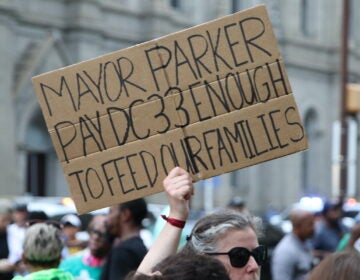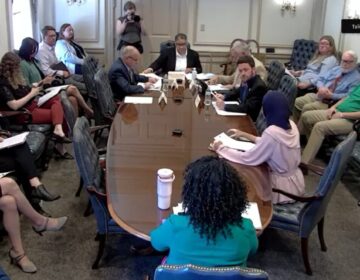Madeleine Albright: Democrats share blame in the rise of Trump
Madeleine Albright's new book, "Fascism, A Warning," is an eloquent diagnosis of the grassroots ills that threaten democracies and give rise to demagogues like Donald Trump.

Former U.S. Secretary of State Madeleine Albright arrives to address an interactive session on "America, India and Democracy in the 21st Century" in New Delhi, India, Tuesday, Sept. 5, 2006. The session was organized by The Aspen Institute India and Confederation of Indian Industry. Also seen background right is President of The Aspen Institute India Tarun Das. (AP Photo/Gurinder Osan)
Madeleine Albright’s new book, “Fascism, A Warning,” is an eloquent diagnosis of the grassroots ills that threaten democratic governments and give rise to demagogues like Donald Trump. As she warns, “When economic and social conditions deteriorate and democratic politicians fail in their obligation to lead, the lure of a gifted pied piper can be hard to resist.”
Well, it takes two parties to fail. As much as we tend to blame Republicans for saddling us with the worst excuse for a “president” in living or dead memory, the inescapable truth is that former Democratic strongholds in the key Rustbelt states rejected the ’16 Democratic candidate and put the pied piper where he demonstrably does not belong. Clearly, the Democratic party bears some responsibility for the current disaster.
I had the opportunity to ask Albright about that. She and I conversed on stage last Wednesday night, in an event sponsored by the Free Library of Philadelphia. Knowing that she was a veteran Democrat – having served as U.N. ambassador and Secretary of State under Bill Clinton; and having supported Hillary in 2016 – I anticipated a defensive response. Fortunately, I was wrong.
Early in the hour, as we talked about Trump’s loyalists – the 35 to 40 percent of the electorate that stays loyal no matter how badly he trashes the rule of law and the office he occupies – Albright wisely explained why this was so:
“There are some very unhappy people in this country who feel that they have been neglected. That, as the situation has changed in terms of technology, that they are the ‘losers,’ that they have lost their jobs. That our education system has not prepared them with new skills in order to be able to participate. And that there are a bunch of ‘elitists’ (in government), and that not enough attention is being paid to them…So there is no faith in institutions, and that is where the problem comes.”
Basically, she had teed up my question.
I pointed out that the counties Trump won in 2016 accounted for only 36 percent of the nation’s economic output; that the small working-class Rustbelt cities and towns (notably in the key Electoral College states of Pennsylvania, Wisconsin, and Michigan), the communities that put Trump over the top, “used to be the linchpin of the Democratic coalition.”
I didn’t want to lard my question with statistics – such as the stunning fact that Trump’s nationwide winning margin among white working-class voters was 40 percentage points, a 25-point hike from Mitt Romney’s previous winning margin – and it wasn’t my role on stage that night to riff at length about how the Democrats have largely become a party of upscale professionals and downscale minorities (the so-called “Obama coalition”) at the expense of people who live between the two coasts.
Besides, it was obvious what I was saying: Democrats, who once prided themselves on championing the working stiff, have lost their mojo in the heartland. So I asked Albright: “To what extent has the Democratic party helped put us in this pickle? Just by not paying sufficient attention to the people who used to count on the Democratic party to be on their side?”
I should’ve used a stronger word than “pickle.” For the sake of accuracy, I should’ve said “this sewer of rampant criminality.” But Albright got the gist, and she was forthright in her response:
“I am a card-carrying Democrat. (During the ’16 campaign) I did spend a lot of time in Pennsylvania…I went out into the countryside and you could see what was going on. It wasn’t just the cities, the mill towns or whatever, but the rural areas where there just was a real sense that nobody cared about them…I was trying to understand what motivated the people who did not like my candidate or the Democratic party. I think in many ways we lost contact with our base. We are a labor-based party, and have been, but there was a disconnect…I’ve been a very proud Democrat, but the bottom line is, there has been a disconnect, and I think there are these issues in terms of, ‘Are we too much into identity politics.’…I think the Democratic party did lose contact with the base.”
She got that right. Granted, she didn’t elaborate on Hillary’s failure to connect with the traditional base, on Hillary’s failure to even set foot in the working communities that were once strongly Democratic, and she didn’t address the party’s decades-long failure to help the people who felt left behind by the globalized economy. But we only had an hour, and we had to move on. She needed to address the metastasizing Trumpian threat, and to call on patriotic Americans to stop “the incremental erosion” of democratic values.
But if we’re going to reclaim the country we love, rest assured that Democrats will need to reconnect with those who feel forgotten. The impending midterm campaigns will be a good place to begin.
WHYY is your source for fact-based, in-depth journalism and information. As a nonprofit organization, we rely on financial support from readers like you. Please give today.




